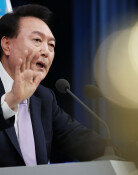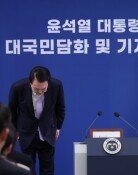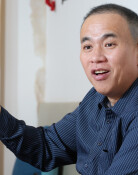Aug. 15 speeches of Korean, Japanese leaders have common ground
Aug. 15 speeches of Korean, Japanese leaders have common ground
Posted August. 22, 2013 06:28,
I was somewhat surprised, watching President Park Geun-hye delivering her Liberation Day speech on TV on August 15.
While urging Japan to face the past, she said, I believe that the great majority of the Japanese people desire to see our two countries stand together to achieve peace and prosperity in Northeast Asia. The basis of trust between the people of Korea and Japan is already considerably broad, and closer relationships are developing as Koreans and Japanese, especially young people, engage with one another and share their love for not only Hallyu but also other parts of their respective cultures.
She was right. Staying in Seoul, I graduated from the Korean Language Education Center the other day. The institute is full of Japanese women. In my class alone, five Japanese students of my daughters age also graduated.
For example, Ayako quit her job to study in Korea after becoming friends with a Korean whom she met in Canada. She says she will look for a job related with both Korea and Japan. Eriko, who showed up at her graduation ceremony in hanbok, the Korean traditional dress, used to work at an entertainment production company in Tokyo. She aspires to form a band of Koreans and Japanese for overseas music market. She will go to the Philippines to learn English. Riho, who says her entire family is big fans of Hallyu, plans to return to her university in Osaka to study with a goal of becoming a Korean-language teacher.
On the other hand, bookstores in Seoul have piles of copies of Haruki Murakamis new novel. There is a quiet boom of Japanese fashion among Korean women, not to mention that of animations and comics. When I went to Sapporo recently, I was surprised to see many Koreans having their golf bags checked at the airport.
President Park must have been aware of such reality when she said, The basis of trust between the people of Korea and Japan is already considerably broad. She went on to say, If politics cannot follow the heart of its people and instead returns to the past, a brighter future will never come. Isnt it that she expressed a little bit of self-reflection in addition to making demands on Japan?
On the same day in Tokyo, Japanese Prime Minister Shinzo Abes speech at the Memorial Ceremony for the War Dead did not correspond to President Parks address because he failed to express his will of self-reflection and condolences to Asian victims. Although the ceremony was a domestic event, it is regrettable that he avoided making remarks that many of his predecessors did over the last 20 years. One cannot blame Korea for being wary about the possibility that former Japanese Prime Minister Tomiichi Murayamas 1995 statement that apologized Japans colonial rules and aggression will change some day.
I would like to appeal to the people of Korea who jeer at Japan. Why do they claim that the Japanese government has never repented of nor apologized so far, while urging Tokyo not to change the Murayama statement? Why do they urge Japan not to change the 1993 statement by the Chief Cabinet Secretary Yohei Kono who apologized for the Imperial Japanese militarys sex slavery issue, while claiming that Tokyo has consistently denied it?
It is true that the Japanese government created the Asian Womens Fund in the past and conveyed compensation money raised through donations, even though the offering was hardly accepted in Korea. Four former Japanese prime ministers also sent letters of apology, and not a few elderly women accepted them. Leading the efforts were none other than Murayama and Kono. Unilateral criticisms that seem to ignore such facts are a factor that pushes the Murayama and Kono statements to predicament.
Then, what should the leaders of Korea and Japan do for the bilateral relations? I remember that President Parks autobiography contains a fact that attracts my eyes. She described the situation in which in 1997, when she playing the role of the first lady after losing her mother, the Korea-U.S. relations were in a perilous stage after then U.S. President Jimmy Carter visited Seoul and called for the withdrawal of U.S. troops from Korea, getting into a heated argument with President Park Chung-hee.
During a meeting with Rosalynn Carter, the president`s daughter talked about jogging, which the U.S. president liked very much. Jogging is very good for a healthy person but bad for one who just had a surgery, she told the U.S. first lady. Comparing her countrys situation to that of a patient, Park said that withdrawing the U.S. troops from Korea, which was still suffering from the scars of the Korean War and vulnerable to big threats, was like forcing a patient to go jogging. The message was conveyed to Mr. Carter and changed the situation at a stroke, sending the troop pullout issue back to square one.
Resolving the current Korea-Japan relations requires such wit and wisdom. The two countries need the power of words that can shake the other sides heart. Regrettably, it maybe that the two leaders of Korea and Japan do not have Lady Park Geun-hye of the past.
The two leaders August 15 messages missed each other. However, the two leaders, who praised only the precious sacrifices and efforts by their own people, actually had two same keywords.
President Park said that liberal democracy has been the core value of Korea since its founding and repeated the word peace. Japanese Prime Minister Abe also noted that Japan has respected liberty and democracy and walked on the path of peace. He stressed that his country would strive for permanent peace of the world.
There is certainly a point of contact. Isnt it that the two should use it as a clue?







